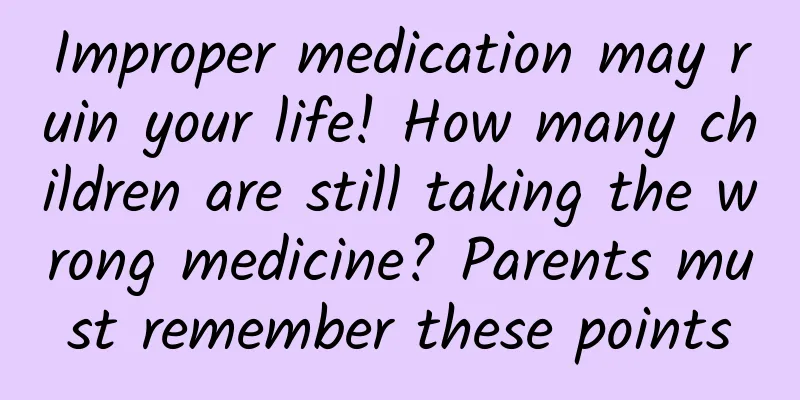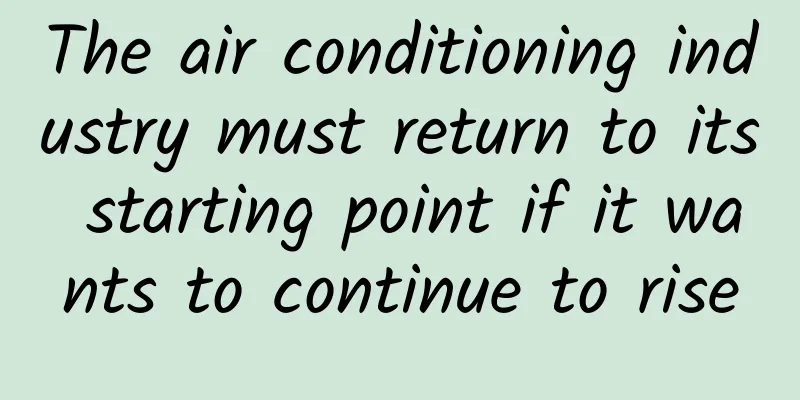Improper medication may ruin your life! How many children are still taking the wrong medicine? Parents must remember these points

|
Expert of this article: Dr. Qin Wei, Chief Pharmacist, Department of Pharmacy, China-Japan Friendship Hospital It is very common for children to get sick and take medicine. However, "the medicine will cure the disease" is not possible in all cases, and improper use of medicines may cause greater harm to the body. According to incomplete statistics, about 30,000 children in my country suffer from deafness and other adverse reactions due to irrational use of drugs every year. In short, improper use of medication may affect a child's life, and parents must pay attention to their children's medication issues. Today, I will popularize some knowledge about the use of medicines for children. How terrible is it for children to use medicine improperly? As children grow and develop, their organs and tissues gradually grow and their functions mature. They are particularly sensitive to drugs that affect the nerves, bone development and endocrine system. Long-term use of central nervous system transplant agents may cause damage to the central nervous system; long-term use of adrenocortical hormones may seriously affect children's growth and development, causing adrenal cortex insufficiency or atrophy in children; long-term use of androgens can cause premature skeletal closure, affect children's growth, and even cause precocious puberty in boys and masculinization of female babies. What are the common misunderstandings about children’s medication? Myth 1: If a child has a cold or diarrhea, he or she must take anti-inflammatory drugs immediately. First of all, the "anti-inflammatory drugs" we often talk about in our lives are actually antibacterial drugs, which are a class of drugs used to inhibit or kill pathogens such as bacteria or fungi. In my country, 40% of adverse drug reactions each year are caused by the abuse of antibacterial drugs. If a child has a cold or diarrhea, parents must go to the hospital for treatment. The doctor will diagnose the cause and prescribe reasonable treatment drugs for the child. Parents should not give their children so-called "anti-inflammatory drugs" at will. Myth 2: You need to take antipyretics immediately when you have a fever If your child has a fever, parents can first use a thermometer to measure the child's temperature. If the temperature is below 38.5℃, physical cooling can be used to help the child reduce the fever. If the temperature exceeds 38.5℃, antipyretics are needed. If acetaminophen or ibuprofen is used as an antipyretic, repeat the medication every 4-6 hours, and do not take more than four times a day. If the fever does not subside, be sure to take the child to see a doctor in time and do not delay the condition. Which medicines must not be used or should be used with caution by children? Common drugs that are prohibited or used with caution in children include: Banned quinolone drugs: Children under 18 years old are prohibited from using quinolone drugs such as levofloxacin, ciprofloxacin, and moxifloxacin. Taking these drugs may cause abnormal cartilage development in children. Benzyl alcohol solvent is prohibited: injections using benzyl alcohol as a solvent are prohibited for children, as intramuscular injection of this solvent may cause gluteal muscle contracture. Use tetracycline with caution: It should not be used in children under 8 years old, as it may cause yellowing of permanent teeth, poor development of tooth enamel, and inhibition of bone growth. Use aminoglycosides with caution: Aminoglycosides such as kanamycin and streptomycin are ototoxic or nephrotoxic and should be used with caution in children. What should we pay attention to when taking medicine for children? 1. Children themselves have poor medication compliance. "Compliance" generally means listening to the doctor and taking the medicine on time and in the right amount. Children are prone to forgetting to take medicine, missing a dose, or reducing or stopping the dose without authorization, and may even secretly drink sweet medicine. Parents should pay attention to this, give their children medicine in time according to the doctor's instructions, and pay attention to the efficacy and adverse reactions. In addition, medicines at home should be placed out of reach of children to prevent children from accidentally taking certain medicines. 2. The doctor will calculate the dosage of a certain medicine for the child based on the child's age or weight. For example, some medicines require three-quarters of a tablet, and some require 0.75 bags. Parents must not be bothered by giving their children a whole bag or half a bag. They must use the medicine according to the usage and dosage prescribed by the doctor. 3. Parents should learn to read drug instructions. The instructions will clearly state what diseases each drug is suitable for, how much a child of a certain age should take, or how to calculate the dosage for a child based on weight. The pictures in this article with the "Science Popularization China" watermark are all from the copyright gallery. The pictures are not authorized for reprinting. |
Recommend
Keep the moral bottom line: 15 kinds of "rogue" methods of APP promotion
Rogue promotion methods are methods that some man...
Roommate: Let me explain! I don’t want to grind my teeth, but I don’t have the final say!
Produced by: Science Popularization China Author:...
Ten sets of Apple big data that shocked foreigners
[[149904]] Steve Jobs' iPhone is a work of ar...
Attract 150,000 fans in 10 days with 0 cost. It turns out that the AARRR model can be used in this way!
After reading many articles about the AARRR model...
The ancestor of pterosaurs couldn’t fly?
Recently, a new paper published in Nature stated ...
HIMSS: 2024 Healthcare Industry Cybersecurity Survey Report
Cybersecurity Budget Investment – Organizations...
@Parents and classmates—school is about to start, please keep these health tips in mind!
Planning: Li Peiyuan and Zhang Chao Produced by: ...
Analysis of GuangDianTong information flow optimization techniques!
Guangdiantong is one of Tencent’s two major infor...
6 basic elements of complete event promotion planning
Before sharing your content, please consider the ...
Director Chen's "Douyin Talk Capsule" allows you to have a high-level personality
Training course content: You are the boss, you co...
Tianwen-1 Mars orbiter continues to conduct multi-dimensional exploration two years after its launch
Shanghai, Feb. 10 (Xinhua) -- The Tianwen-1 Mars ...
Complete tutorial for Kuaishou operation! (Personal account)
1 The predecessor of Kuaishou, called "GIF K...









